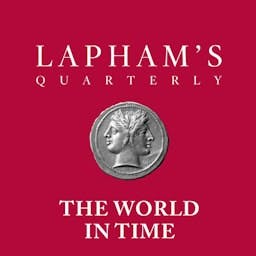

The World in Time / Lapham’s Quarterly
Lapham’s Quarterly
Donovan Hohn, the acting editor of Lapham's Quarterly, interviews historians, writers, and journalists about books that bring voices from the past up to the microphone of the present. New episodes are released weekly.
Episodes
Mentioned books

May 31, 2019 • 56min
Episode 44: Brenda Wineapple
Lewis H. Lapham talks with the author of “The Impeachers: The Trial of Andrew Johnson and the Dream of a Just Nation.”
Thanks to our generous donors. Lead support for this podcast has been provided by Elizabeth “Lisette” Prince. Additional support was provided by James J. “Jimmy” Coleman Jr.

May 17, 2019 • 44min
Episode 43: Nigel Hamilton
Lewis H. Lapham talks with Nigel Hamilton, author of War and Peace: FDR's Final Odyssey: D-Day to Yalta, 1943–1945.

May 3, 2019 • 46min
Episode 42: Greg Grandin
Lewis H. Lapham talks with Greg Grandin, author of The End of the Myth: From the Frontier to the Border Wall in the Mind of America.

Apr 19, 2019 • 39min
Episode 41: Andrew S. Curran
Lewis H. Lapham talks with Andrew S. Curran, author of “Diderot and the Art of Thinking Freely.”
Thanks to our generous donors. Lead support for this podcast has been provided by Elizabeth “Lisette” Prince. Additional support was provided by James J. “Jimmy” Coleman Jr.

Apr 5, 2019 • 31min
Episode 40: Philipp Blom
Lewis H. Lapham talks with Philipp Blom, author of “Nature’s Mutiny: How the Little Ice Age of the Long Seventeenth Century Transformed the West and Shaped the Present.”
Thanks to our generous donors. Lead support for this podcast has been provided by Elizabeth “Lisette” Prince. Additional support was provided by James J. “Jimmy” Coleman Jr.

Dec 21, 2018 • 44min
Episode 39: Alan Rusbridger
Lewis H. Lapham talks with Alan Rusbridger, author of Breaking News: The Remaking of Journalism and Why It Matters Now.
Thanks to our generous donors. Lead support for this podcast has been provided by Elizabeth “Lisette” Prince. Additional support was provided by James J. “Jimmy” Coleman Jr.

Dec 7, 2018 • 46min
Episode 38: Joseph J. Ellis
Lewis H. Lapham talks with Joseph J. Ellis, author of “American Dialogue: The Founders and Us.”
Thanks to our generous donors. Lead support for this podcast has been provided by Elizabeth “Lisette” Prince. Additional support was provided by James J. “Jimmy” Coleman Jr.

Nov 9, 2018 • 35min
Episode 37: David Wootton
Lewis H. Lapham talks with David Wootton, author of Power, Pleasure, and Profit: Insatiable Appetites from Machiavelli to Madison.
Thanks to our generous donors. Lead support for this podcast has been provided by Elizabeth “Lisette” Prince. Additional support was provided by James J. “Jimmy” Coleman Jr.

Oct 26, 2018 • 34min
Episode 36: Sarah Churchwell
Lewis H. Lapham talks with Sarah Churchwell, author of Behold, America: The Entangled History of "America First" and “the American Dream.”
Thanks to our generous donors. Lead support for this podcast has been provided by Elizabeth “Lisette” Prince. Additional support was provided by James J. “Jimmy” Coleman Jr.

Oct 12, 2018 • 38min
Episode 35: Jill Lepore
Lewis H. Lapham talks with Jill Lepore, author of These Truths: A History of the United States.
Thanks to our generous donors. Lead support for this podcast has been provided by Elizabeth “Lisette” Prince. Additional support was provided by James J. “Jimmy” Coleman Jr.


